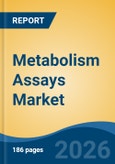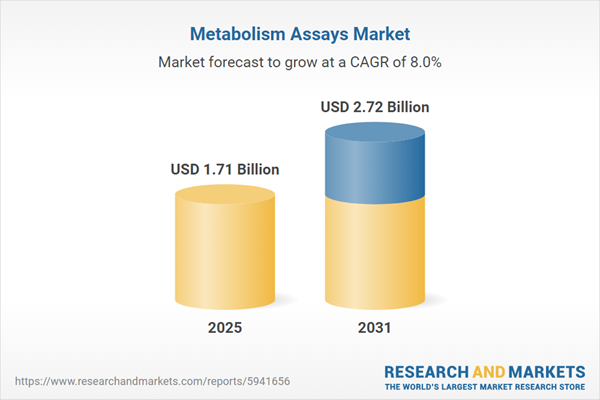Speak directly to the analyst to clarify any post sales queries you may have.
10% Free customizationThis report comes with 10% free customization, enabling you to add data that meets your specific business needs.
Despite this positive growth outlook, the market encounters significant obstacles due to the high costs and technical complexities associated with advanced assay technologies. Multiplexing instruments and reagents necessitate substantial capital investment and specialized personnel, which restricts their adoption in smaller research laboratories and academic institutions with limited budgets. This financial hurdle, combined with the difficulty of interpreting complex metabolomic data, hampers the widespread implementation of these assays in resource-constrained regions, thereby slowing the overall expansion of the global market.
Market Drivers
The surging global prevalence of chronic metabolic diseases, particularly diabetes, acts as the primary catalyst for the metabolism assays market. As patient populations grow, pharmaceutical companies and academic researchers are prioritizing the development of therapeutics that target metabolic pathways, leading to increased usage of assays for target validation and lead optimization. This trend is underscored by the rising number of individuals requiring long-term glucose regulation management, creating a continuous demand for precise diagnostic and monitoring tools. According to an analysis in The Lancet from November 2024, titled 'Global inequalities in diabetes prevalence', the global number of adults living with diabetes has reached 828 million, a figure that necessitates the rapid scaling of metabolic screening capabilities.Furthermore, increasing research and development investment by pharmaceutical and biotechnology firms reinforces market expansion as stakeholders aim to capitalize on the lucrative anti-obesity and diabetes drug sectors. Companies are channeling significant capital into high-throughput screening and metabolic profiling to identify novel biomarkers and therapeutic candidates, which requires advanced assay platforms.
For instance, Eli Lilly and Company reported in their February 2024 '2023 Annual Report' that research and development expenses rose to $9.31 billion, largely driven by late-stage investments in metabolic dysfunction treatments. This financial commitment aligns with broader industry trends where regulatory success drives reinvestment in assay technologies, as evidenced by the U.S. Food and Drug Administration's confirmation in 2024 of 55 novel molecular entity approvals in the preceding year, reflecting an innovation environment heavily dependent on metabolic data.
Market Challenges
The substantial cost and technical complexity inherent in advanced assay technologies present a significant barrier to the growth of the Global Metabolism Assays Market. Advanced multiplexing instruments and the necessary reagents for these quantitative analytical procedures require major capital expenditure, which directly limits their adoption in cost-sensitive environments. Smaller research laboratories and academic institutions, which are essential for broad market penetration, often lack the financial resources to procure and maintain such expensive infrastructure. Additionally, the need for specialized personnel to interpret complex metabolomic data results in a skills gap that further restricts the deployment of these assays in developing regions.This financial and technical exclusivity hinders market growth by limiting the use of high-throughput screening tools primarily to well-funded pharmaceutical giants, thereby suppressing volume growth across the wider scientific community. The impact of these financial constraints is highlighted by recent investment trends; according to the Massachusetts Biotechnology Council (MassBio), venture capital investments in regional biopharmaceutical companies declined by 17.1% in the first half of 2025 compared to the same period in 2024. This contraction in available funding exacerbates the challenge, compelling laboratories to delay upgrades to advanced assay platforms and directly decelerating the revenue trajectory of the global market.
Market Trends
The integration of AI-driven data analytics is fundamentally transforming the Global Metabolism Assays Market by resolving the bottleneck of complex data interpretation in metabolic profiling. The high-dimensional datasets produced by modern assays demand advanced machine learning algorithms to detect subtle biomarker patterns that traditional statistical methods might overlook. This technological integration accelerates hit identification and improves the predictive accuracy of metabolic responses, thereby enhancing operational efficiency in drug discovery workflows. According to the 'State of AI in Healthcare and Life Sciences: 2025 Trends' survey by NVIDIA in July 2025, over 80% of healthcare and life sciences professionals indicated that AI adoption has increased revenue at their organizations, confirming the commercial and operational value of these computational tools.Concurrently, the emergence of organ-on-a-chip and 3D culture models marks a significant shift toward physiologically relevant testing environments, reducing dependence on animal models that often fail to predict human metabolic toxicity. These microphysiological systems mimic the dynamic biochemical microenvironments of human tissues, enabling more accurate assessments of drug metabolism and bioenergetics. Manufacturers are increasingly introducing integrated platforms that combine these models with automation to support industrial-scale screening. For example, Drug Discovery News reported in October 2025 that CN Bio unveiled the PhysioMimix Core system, an all-in-one organ-on-a-chip platform capable of high-throughput screening for up to 288 samples simultaneously, demonstrating the scalability necessary for broader pharmaceutical adoption.
Key Players Profiled in the Metabolism Assays Market
- Merck KGaA
- Thermo Fisher Scientific, Inc.
- Abcam Limited
- Agilent Technologies, Inc.
- Promega Corporation
- Kaneka Eurogentec S.A.
- RayBiotech Life, Inc.
- Sartorius AG
- Elabscience Bionovation Inc.
- BMG LABTECH GmbH
Report Scope
In this report, the Global Metabolism Assays Market has been segmented into the following categories:Metabolism Assays Market, by Product Type:
- Assay Kits & Reagents
- Instruments & Analyzers
Metabolism Assays Market, by Application:
- Diagnostics (Diabetes
- Obesity
- Cancer
- Cardiovascular diseases
- Other)
- Research
Metabolism Assays Market, by Technology:
- Colorimetry
- Fluorimetry
- Spectrometry
Metabolism Assays Market, by End-use:
- Hospitals
- Diagnostic Labs
- Pharmaceutical & biopharmaceutical companies
- others
Metabolism Assays Market, by Region:
- North America
- Europe
- Asia-Pacific
- South America
- Middle East & Africa
Competitive Landscape
Company Profiles: Detailed analysis of the major companies present in the Global Metabolism Assays Market.Available Customization
The analyst offers customization according to your specific needs. The following customization options are available for the report:- Detailed analysis and profiling of additional market players (up to five).
This product will be delivered within 1-3 business days.
Table of Contents
Companies Mentioned
The key players profiled in this Metabolism Assays market report include:- Merck KGaA
- Thermo Fisher Scientific, Inc.
- Abcam Limited
- Agilent Technologies, Inc.
- Promega Corporation
- Kaneka Eurogentec S.A.
- RayBiotech Life, Inc.
- Sartorius AG
- Elabscience Bionovation Inc.
- BMG LABTECH GmbH
Table Information
| Report Attribute | Details |
|---|---|
| No. of Pages | 186 |
| Published | January 2026 |
| Forecast Period | 2025 - 2031 |
| Estimated Market Value ( USD | $ 1.71 Billion |
| Forecasted Market Value ( USD | $ 2.72 Billion |
| Compound Annual Growth Rate | 8.0% |
| Regions Covered | Global |
| No. of Companies Mentioned | 11 |









